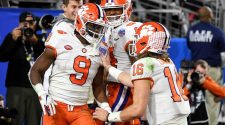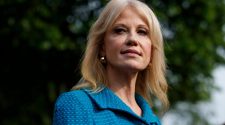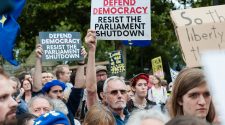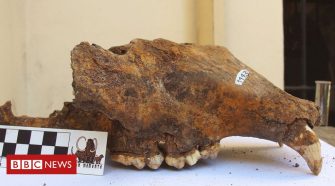In this Dec. 16, 2019, file photo a Boeing worker walks past a 737 model fuselage and a giant mural of a jet on the side of the manufacturing building behind in Renton, Wash. (AP Photo/Elaine Thompson, File)
Work got underway in Olympia on Tuesday on one of two bills that would remove a massive B&O tax break that Boeing has been receiving for more than 16 years.
“The goal of this legislation is to prevent tariffs from being leveled on our aerospace industry as well as other sectors, which would have a detrimental impact on our economy,” Democratic Rep. Pat Sullivan, who sponsored the bill (HB 2948), explained to a House committee.
Washington state lawmakers push to suspend Boeing tax breaks
Boeing asked lawmakers to make the move to settle a longstanding international trade dispute with the World Trade Organization, which ruled the tax break was an illegal government subsidy. The trade dispute has gone on for years between the United States and the European Union over Boeing and Airbus each accusing the other of benefiting from illegal government subsidies. The U.S. has already hit the E.U. with tariffs over the WTO’s ruling on Airbus, and the E.U. was expecting to be able to reciprocate after an upcoming ruling from the WTO. Boeing says ending this tax break should remove that threat, which would impact much more than just Washington’s aerospace industry.
“The European Union has issued the preliminary tariff list that targets food and beverages, like wine and coffee, agricultural products like apples and cherries, fish and shellfish, including Pacific salmon, and consumer goods like video games,” Lori Otto Punk, President of the Washington Council on International Trade told the committee. “Washington is the most trade dependent state in the nation with approximately 40 percent of all jobs tied to international commerce.”
Lori Otto Punk said the state exports $60 billion worth of goods every year, which accounts for 85,000 jobs in Washington.
Washington’s wine industry also has concerns.
“As of July 2019, our five largest wine import markets for Washington state were Germany, Sweden, Denmark, Switzerland, and the United Kingdom,” said Josh McDonald with the Washington Wine Institute.
“Between those five markets, we sell over $10 million in Washington wine, which makes up roughly 25 percent total exports for the region,” McDonald added.
There were two possible stumbling blocks about getting Sullivan’s bill, or its companion bill in the Senate, passed.
The first: a clause in the original Boeing tax break agreement that requires the state to give Boeing some type of replacement economic support if those tax breaks are taken away. During Tuesday’s hearing, Democratic Rep. Amy Wallen asked whether Boeing planned to require the state to make it whole should the bill pass.
“If this legislation is approved, we will not be seeking any compensation,” said Bill McSherry, Boeing’s Vice President of Government Relations.
Republican Rep. Brandon Vick asked about the second possible issue, about the language in the bill that lays out a path to reinstating the tax if the U.S. and E.U. resolve the trade dispute.
“There’s been some debate over whether this suspends the B&O tax incentive or repeals it altogether, what’s your opinion on what the bill actually does?,” Vick asked.
“In our opinion, the B&O tax preference for aerospace is immediately ended or repealed, but there is a provision that would allow for its reinstatement in certain circumstances that being of an agreement is reached between negotiators in the WTO case that specifically allows for the aerospace incentive to be seen as compliant. I could not comment on the probability of that occurring,” McSherry said.
The concern over the language to reinstate the tax – or the snap-back provision – surrounds a commitment from Boeing about where it will build its aircraft and local jobs.
“We believe that any snap-back provision that does not include effective measures to maintain and grow aerospace workforce jobs here in Washington state is a continuation of a policy that had failed to provide its intended benefits to our aerospace workforce and our state’s taxpayers,” Brandon Anderson with SPEEA, the union representing Boeing workers, told the panel.
Anderson called on lawmakers to amend the bill to include a strong job-related accountability feature tied to any commitment to reinstate the aerospace tax incentives.
Why Washington will weather Boeing’s 737 MAX crisis
Republican leaders say they want to see something specific about where the money saved by repealing the aerospace tax incentive, which has saved Boeing hundreds of millions of dollars, will go.









![Google Stadia exclusives push potential players to data centers [Updated]](https://newsfortomorrow.com/wp-content/uploads/2019/08/1566260485_Google-Stadia-exclusives-push-potential-players-to-data-centers-Updated-225x125.jpg)





